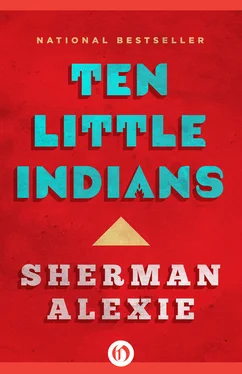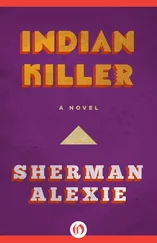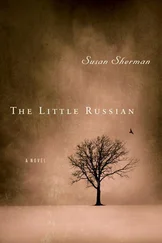“Hey, Frank, man, I don’t like what I’m seeing here. You’re hurting really bad here. You maybe want me to call somebody for you?”
Frank laughed and ran. He ran away from Preacher and the basketball court. Frank ran until he fell on somebody’s green, green lawn, and then Frank stood and ran again.
After Preacher’s devastating sermon, Frank didn’t play basketball for two weeks. He didn’t leave the house or answer the telephone or the door. He ate all of the food in the house and then drank only water and fruit juice. He was on his own personal hunger strike. Mr. Death, you are an obese bastard, Frank thought, and I’m going to starve you down until I can fit my hands around your throat and choke you. Frank lost fifteen pounds in fifteen days. He wondered how long he could live without food. Forty, fifty, sixty days? He wondered who would find his body.
Three weeks after Preacher’s sermon, and after dozens of unanswered phone calls, Russell found Frank’s address in his files, drove to the house, crawled through an unlocked window, and found Frank dead in bed. Well, he thought Frank was dead.
“You’re breaking and entering,” Frank said and opened his eyes.
“You scared me,” Russell said. “I thought you were dead.”
“Black man, you keep crawling through windows in this gentrified neighborhood, and you’re going to get shot in your handsome African head.”
“I was worried about you.”
“Well, aren’t you the full-service personal trainer? You should be charging me more.” Frank sat up in bed. He was pale and clammy and far too thin.
“You look terrible, Frank. You’re really sick.”
“I know.”
“I’m going to call for help, okay? We need to get you help, all right?”
“Okay.”
Russell walked into the kitchen to use the telephone and hurried back.
“They’ll be here soon,” he said.
“What would you have done if you’d come too late?” Frank asked. “You know, part of me wishes you’d waited too long.”
“I did wait too long. You’re sick. And I helped you get sick. I’m sorry. I just wanted to believe in what you believed.”
“You’re not going to hug me now, are you?” Frank asked.
Both men laughed.
“No, I’m not going to hug you, I’m not going to kiss you, I’m not going to recite poetry to you,” Russell said. “And I’m not going to crawl under these nasty sheets with you, either.”
An ambulance siren wailed in the distance.
“Because, well,” Frank said, “I know you’re gay and all, and I care about you a bunch, but not in that way. If we were stuck on a deserted island or something, or if we were in prison, then maybe we could be Romeo and Juliet, but in the real world, you’re going to have to admire me from afar.”
“Yeah, let me tell you,” Russell said, “I’ve always been very attracted to straight, suicidal, bipolar anorexics.”
“And I’ve always been attracted to gay, black, narcissistic codependents.”
Both men laughed again because they were good at laughing.
One year after Russell saved Frank’s life, after four months of residential treatment and eight months of inpatient counseling, Frank walked into the admissions office at West Seattle Community College. He’d gained three extra pounds for every twelve of the steps he’d taken over the last year, so he was fat. Not unhappy and fat, not fat and happy, but fat and alive, and hungry, always hungry.
“Can I help you? Is there anything I can do?” the desk clerk asked. She was young, blond, and tentative. A work-study student or scholarship kid, Frank thought, smart and pretty and poor.
“Yeah,” he said, feeling damn tentative as well. “I think, well, I want to go to school here.”
“Oh, that’s good. That’s really great. I can help. I can help you with that.”
She ducked beneath the counter, came back up with a thick stack of paper, and set it on the counter.
“Here you go, this is it,” she said. “You have to fill these out. Fill them out, and sign them, and bring them back. These are admission papers. You fill them out and you can get admitted.”
Frank stared at the thick pile of paper, as mysterious and frightening to him as Stonehenge. The young woman recognized the fear in his eyes. She came from a place where that fear was common.
“What’s your name?” she asked.
“Frank,” he said. “Frank Snake Church.”
“Are you Native American?”
“Why do you ask?”
“Well, they have a Native American admissions officer here. Her name is Stephanie. She works with the Native Americans. She can help you with admissions. You’re Native American, right?”
“Yes, I’m Indian.”
“If you don’t mind me asking, it’s a personal question, but how old are you?”
“I’m forty-one.”
“You know, they also have a program here for older students, you know, for the people who went to college when you were young — when you were younger — and come back.”
“I never went to college before.”
“Well, the program is for all older students, you know? They call it Second Wind.”
“Second Wind? That sound like a bowel condition you have when you’re old.”
The young woman laughed. “That’s funny. You’re funny. It does sound sort of funny, doesn’t it? But it’s a really good program. And they can help you. The Second Wind program can help you.”
She reached beneath the counter again, pulled out another stack of paper, and set it beside the other stack of paper. So much paper, so much work. He didn’t know why he was here; he’d come here only because his therapist had suggested it. Frank felt stupid and inadequate. He’d made a huge mistake by quitting his Forest Service job, but he could probably go back. He didn’t want to go to college; he wanted to walk the quiet forests and think about nothing as often as he could.
“Hey, listen,” Frank said, “I’ve got another thing to go to. I’ll come back later.”
“No, listen,” she said, because she was poor and smart and had been poorer and was now smarter than people assumed she was. “I know this is scary. I was scared to come here. I’ll help you. I’ll take you to Stephanie.”
She came around the counter and took his hand. She was only eighteen, and she led him by the hand down the hallway toward the Native American Admissions Office.
“My name is Lynn,” she said as they walked together, as she led him by the hand.
“I’m Frank.”
“I know, you already told me that.”
He was scared, and she knew it and didn’t hate him for it. She wasn’t afraid of his fear, and she wouldn’t hurt him for it. She was so young and so smart, and she led him by the hand.
Lynn led him into the Native American Admissions Office, Room 21A at West Seattle Community College in Seattle, Washington, a city named after a Duwamish Indian chief who died alone and drunk and poor and forgotten, only to be remembered decades after his death for words of wisdom he’d supposedly said, but words that had been written by the mayor’s white assistant. Mr. Death, Frank thought, if a lie is beautiful, then is it truly a lie?
Lynn led Frank into the simple office. Sitting at a metal desk, a chubby Indian woman with old-fashioned eyeglasses looked up at the odd pair.
“Dang, Lynn,” the Indian woman said. “I didn’t know you like them old and dark.”
“Old and dark and bitter,” Lynn said. “Like bus-station coffee.”
The women laughed together. Frank thought they were smart and funny, too smart and funny for him to compete with, too smart and funny for him to understand. He knew he wasn’t smart and funny enough to be in their presence.
“This is Mr. Frank Snake Church,” Lynn said with overt formality, with respect. “He is very interested in attending our beloved institution, but he’s never been to college before. He’s a Native American and a Second Winder.”
Читать дальше












